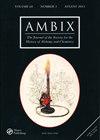Introduction: Medicine, Life, and Transformations of Matter.
IF 0.6
3区 哲学
Q3 HISTORY & PHILOSOPHY OF SCIENCE
引用次数: 0
Abstract
This Ambix special issue explores premodern alchemical ideas and practices in their entanglements with medicine. It employs diverse methods, from traditional close reading to the new distant-reading framework of computational humanities, to investigate alchemical thought over a timespan of several centuries. In medieval times, everyday practices could offer heuristic models of material transformation - such as the fermentation of bread as a model for metallic transmutation (Schmechel). Paracelsus relied on "fire" to link his natural philosophy with his medical alchemy; new computational methods show how his ideas evolved over time (Hedesan). Early modern medical pluralism favoured the thriving of chemical medicine in Italy; diplomatic efforts introduced chemical remedies into acknowledged pharmacopoeias (Clericuzio). An English physician offers William Cavendish both practical distillation recipes and the hope of learning more about the principles of chemistry (Begley). In eighteenth-century France, Diderot draws on chemical ideas to blur the conceptual boundary between living and non-living matter (Wolfe). The papers largely adhere to integrated history and philosophy of science (iHPS) and to a pragmatist "operational ideal of knowledge" (Chang). They showcase the interdisciplinarity of premodern scientific thought and examine how medicine and alchemy, but also theory and (everyday) practice informed each other fruitfully across the ages.导言:医学、生命和物质转化。
本期 Ambix 特刊探讨了前现代炼金术思想和实践与医学的关系。它采用多种方法,从传统的近距离阅读到计算人文学科的新远距离阅读框架,研究了几个世纪以来的炼金术思想。在中世纪,日常实践可以提供物质转化的启发式模型--例如将面包发酵作为金属嬗变的模型(施梅切尔)。帕拉塞尔苏斯依靠 "火 "将他的自然哲学与医学炼金术联系起来;新的计算方法显示了他的思想是如何随着时间的推移而演变的(Hedesan)。现代早期的医学多元化有利于化学医学在意大利的蓬勃发展;外交努力将化学疗法引入了公认的药典(Clericuzio)。一位英国医生向威廉-卡文迪什(William Cavendish)提供了实用的蒸馏配方和学习更多化学原理的希望(Begley)。在十八世纪的法国,狄德罗利用化学思想模糊了生物和非生物之间的概念界限(沃尔夫)。这些论文在很大程度上坚持了综合科学史与科学哲学(iHPS)和实用主义的 "知识操作理想"(Chang)。这些论文展示了前现代科学思想的跨学科性,探讨了医学与炼金术、理论与(日常)实践如何在各个时代卓有成效地相互借鉴。
本文章由计算机程序翻译,如有差异,请以英文原文为准。
求助全文
约1分钟内获得全文
求助全文
来源期刊

Ambix
HISTORY & PHILOSOPHY OF SCIENCE-
CiteScore
0.80
自引率
60.00%
发文量
42
审稿时长
3 months
期刊介绍:
Ambix is an internationally recognised, peer-reviewed quarterly journal devoted to publishing high-quality, original research and book reviews in the intellectual, social and cultural history of alchemy and chemistry. It publishes studies, discussions, and primary sources relevant to the historical experience of all areas related to alchemy and chemistry covering all periods (ancient to modern) and geographical regions. Ambix publishes individual papers, focused thematic sections and larger special issues (either single or double and usually guest-edited). Topics covered by Ambix include, but are not limited to, interactions between alchemy and chemistry and other disciplines; chemical medicine and pharmacy; molecular sciences; practices allied to material, instrumental, institutional and visual cultures; environmental chemistry; the chemical industry; the appearance of alchemy and chemistry within popular culture; biographical and historiographical studies; and the study of issues related to gender, race, and colonial experience within the context of chemistry.
 求助内容:
求助内容: 应助结果提醒方式:
应助结果提醒方式:


